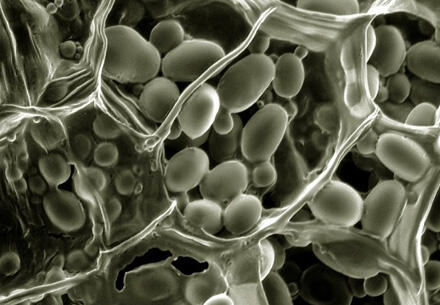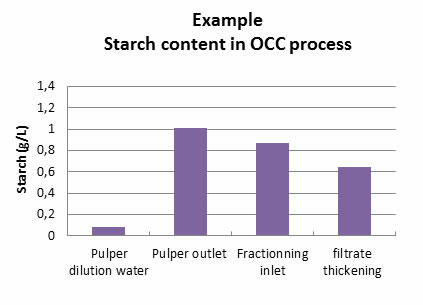
Measuring starch in papermaking circuits
Starch distribution and variations in paper and board recovery processes
- Take measurements and draw up a profile of the starch in papermaking circuits
- Characterise starch in colloidal / dissolved / hydrolysed forms
- Identify areas where starch is degraded by bacteria
- Test techniques for preventing acidogenesis and recovering starch
General informations
High levels of starch can be measured in papermaking circuits, especially with processes using recycled paper and board. The starch released in the pulper circulates in the water within the circuits. It can be degraded by bacteria in certain areas, leading to a large number of problems such as acidification, explosive gas build-up, excess consumption of biocides, and reduced productivity. These areas can be identified by measuring the starch in its various forms (colloidal, soluble, hydrolysed).
The CTP has developed an enzymatic measurement method to characterise starch in papermaking circuits.
This method is particularly suitable for OCC-type processes (involving high starch levels) and for processes involving large proportions of recycled paper (e.g. deinking).
Technical Data and Achievements
Principle
Enzymatic measurement (Biosentec micro kit adapted for papermill industrial water). The assay comprises two stages.
- Solubilisation of the starch with the enzyme alpha-amylase (to obtain D-glucose)
- Colorimetric dosage (340 nm) of the D-gluconate-6-phosphate complex (obtained after adding Hexokynase and Glucose-6-phosphate dehygrogenase).
0.05 g/L to 80 g/L of starch
Measurement uncertainty
U = ± 8% of the value measured
Determination of the various colloidal, soluble and hydrolysed starch fractions
The various fractions are obtained after successive centrifugation and ultrafiltration of the samples taken at various points on the circuits. The starch content in each fraction is then determined using the methodology described above.
Starch hydrolysis and recovery tests
Various tests can be performed to determine the kinetics of starch hydrolysis or to recover the starch released in the circuits in order to reuse it.
These tests provide a basis for rolling out and assessing the effectiveness of measures to prevent starch degradation in papermaking processes.
 |
 |
|